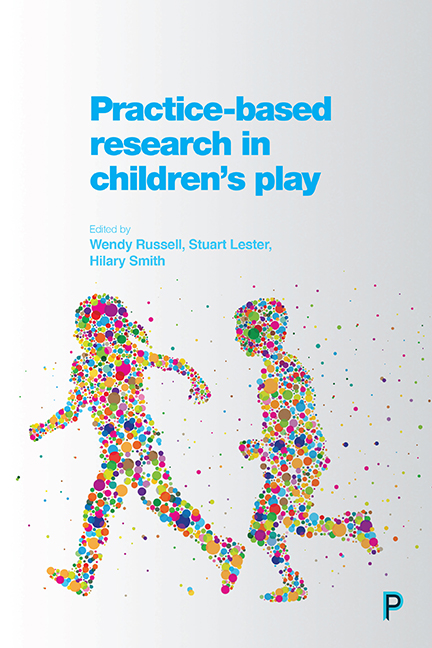Book contents
- Frontmatter
- Contents
- List of figures
- Notes on contributors
- Acknowledgements
- Foreword
- One Perspectives on play research: the practice-theory-research entanglement
- Part One Then and now: historical perspectives
- Part Two Here and there, this and that: spatial and creative perspectives
- Part Three Playfulness and wellbeing
- Closing thoughts
- Appendix: The Playwork Principles
- Index
Nine - Co-creating spaces on an adventure playground: using participatory action research as an approach to continuing professional development
Published online by Cambridge University Press: 05 April 2022
- Frontmatter
- Contents
- List of figures
- Notes on contributors
- Acknowledgements
- Foreword
- One Perspectives on play research: the practice-theory-research entanglement
- Part One Then and now: historical perspectives
- Part Two Here and there, this and that: spatial and creative perspectives
- Part Three Playfulness and wellbeing
- Closing thoughts
- Appendix: The Playwork Principles
- Index
Summary
This chapter discusses the use of participatory action research (PAR) as an approach to reflective playwork practice and continuous professional development (CPD) for people engaged with children's play and playwork. The research took place on Homerton Grove Adventure Playground (HGAP) managed by Hackney Play Association (HPA) and based in Hackney, an inner city borough of London, UK (see Figure 9.1). It explores the conceptual framework and processes brought to this small-scale research project and the ensuing co-production of ways of thinking and acting with ‘play’. Key themes include co-investigation, reflective playwork practice, dialogue, mapping, story-telling and working with meaning. The overall intention was to explore the ways in which playworkers at the playground make sense of and give meaning to their practice in designing and maintaining an environment for play. Working collaboratively with members of the play and playwork team at the University of Gloucestershire (UoG), the adventure playground team explored current articulations of design intentions and practices drawing on a range of conceptual approaches and tools alongside their working experiences. This brought a critical and reflective lens to the production of the Adventure Playground (AP), its everyday rhythms, routines and habits, and the ways in which adults and children cocreate play spaces. It also brought opportunities to experiment with approaches that could deepen understandings of play and playwork practice in a variety of situations from training courses to conference workshops leading to more relevant and reflective approaches to adults working with children's play.
The idea of working together with practitioners and academics on a project to develop shared knowledge and understanding had been emerging over a period of time. A number of both serendipitous and planned events had led towards creating the conditions whereby a partnership project connecting research, learning, theory and practice could begin. These were:
• Two senior staff members had studied at the UoG on the graduate and post-graduate play and playwork programmes.
• Collaborative approaches and working relationships as partners had already been forged through shared ventures in the development of learning, theory and practice in playwork including planning and delivering workshops, conferences and particularly through the Playwork London and UoG collaboration on the ‘Thinking About Play’ programme.
Information
- Type
- Chapter
- Information
- Practice-Based Research in Children's Play , pp. 147 - 166Publisher: Bristol University PressPrint publication year: 2017
